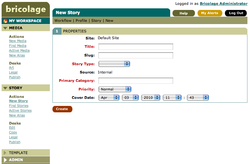| Bricolage | |
|---|---|
| | |
 Bricolage administration screen | |
| Developer | David Wheeler |
| Stable release | 2.0.1 / February 9, 2011 |
| Operating system | Cross-platform |
| Type | Content management system |
| License | BSD license |
| Website | www |
Bricolage was a content management system (CMS) written in the Perl programming language.
Contents
Bricolage was described as an Enterprise Class CMS, [1] competitive in features and capability to high end, high cost proprietary products. [2] Examples of organizations whose web sites use Bricolage include the World Health Organization, Rand Corporation, Macworld, and The Tyee.
Originally authored by David Wheeler to manage content for Salon.com, Bricolage is now maintained by a small group of core developers. Released under the revised BSD license, Bricolage is free and open source software.